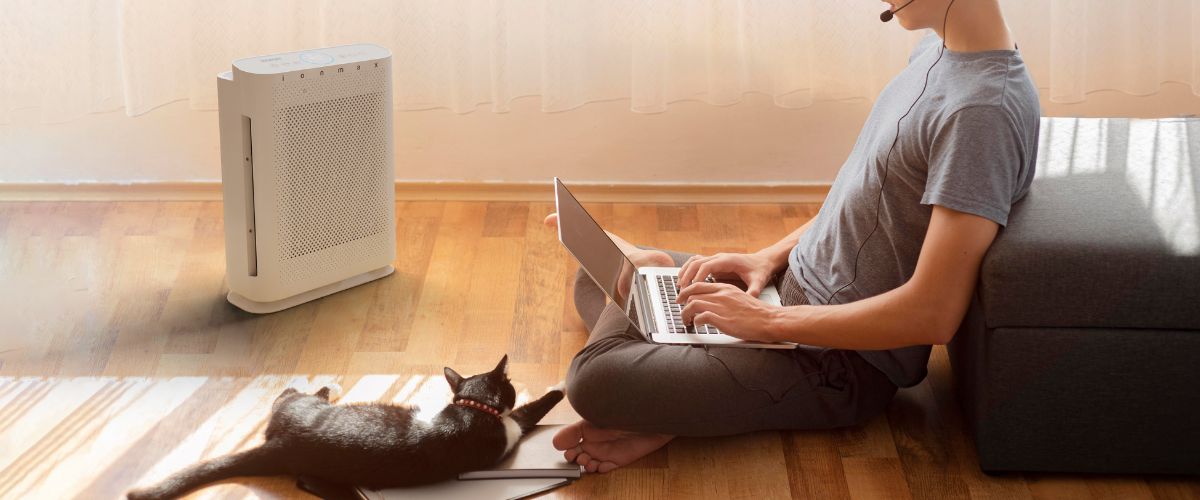Having pets is a wonderful part of life, but they can also make it difficult to keep your indoor air quality fresh and healthy. Unfortunately, pet dander and hair can accumulate in the air and on surfaces, leading to potential allergies or asthma attacks.
Luckily, there are some simple steps you can take to maintain good indoor air quality when you have pets. In this article, we'll discuss how pets affect indoor air quality, the best pets to get for allergies, and various ways to maintain good indoor air quality when you have pets.
How pets affect indoor air quality
Our dear furry friends, no matter how adorable and loving they are, can introduce airborne irritants into your home and trigger allergy and asthma symptoms.
Pet dander
You may think of pet hairs as the main culprit for indoor air pollution but that is not the case. Dander, which are shed dead skin cells, is the main source of pet allergies.
Animal proteins
Other than that, people with pet allergies can also be allergic to the proteins that are present in pet saliva, urine and feces.
Research on pet allergens shows that nearly twice as many people are allergic to cats compared to dogs. The proteins from cats' saliva are so small and light that it can enter the air and stay there for hours, unlike those found in dogs.
Mark Larché, an immunology professor at McMaster University in Ontario, said that the particle size of the cat proteins is just right to be breathed deep into your lungs.
Odours and dust
Not to mention, indoor air quality and health is greatly affected by pet waste and odours when not dealt with appropriately. Dust from litter or sawdust in the bottom of cat litter boxes or cages may also contribute to airborne allergens in the home.
Furthermore, our pets' saliva can dry off on their fur, break down, and turn to dust. These particles can then get circulated in the air through heating, ventilation, and air conditioning (HVAC) systems.
Lingering allergens
Pet dander and similar animal allergens may linger in the air for a longer time than other types of allergens. This is due to the fact that they're small and jagged, enabling them to become airborne and stick to furniture, sheets, textures and even be transported came back into and outside the home.
Even if you don't currently experience allergy or asthma symptoms from your pet, the effects of indoor air pollutants towards your health, such as eye, throat and skin irritation, and respiratory diseases may arise from prolonged exposure.
Hence, no matter what type of pet you have, it's important to know how you can reduce indoor air pollutants, maintain good indoor air quality and prevent any potential harm to you and your family's overall health.

Choose pets with less allergens
If you have asthma or an allergy, most doctors will recommend that you don't get a pet at all. However, there are some recommended pets for allergy sufferers that you can choose from as they produce little to no animal dander.

For dogs, there are several breeds that produce or release less allergens into the air due to their fur and skin composition. For example the Kerry Blue Terrier, Bichon Frise, Poodle, Portuguese Water Dog, and Bergamasco.

For cat lovers, there are a few breeds that are more tolerated by asthma and allergy sufferers. These include the Cornish Rex and Devon Rex, Sphynx, and Balinese cats.

If you love rabbits, the Rex rabbits would be the most suited to allergy sufferers than any other mammal. This breed is known for having a low shed count due to the plushness of its fur, therefore producing less dander.

Allergies to other animals such as horses, mice, rats, rabbits, guinea pigs and birds are not as common as cat and dog allergy. However, the presence of these allergens from clothing and other items may be sufficient to trigger allergic rhinitis (hay fever), and asthma.
Alternatively, the best pets for allergy and asthma sufferers are those that don't produce dander at all. These include fish, turtles, lizards, geckos, and iguanas.
Of course, getting a pet of any kind is a long-term commitment so remember to do your research on your allergy sensitivity, the breed of the animal, and any alternative remedies that you would be willing to use before you make the big decision to adopt a new family member.

Reduce your exposure to pet allergens
The National Asthma Council of Australia (NAC) recommends that if you are sensitive to your own pet, you can reduce your exposure to pet allergens by always washing your hands after touching your pet, and if possible, keep your pet outside most or all of the time, making sure they have a safe, warm home outdoors.
If you have no choice but to keep your pet indoors, you can reduce exposure to pet allergens by creating "no pet" zones in the home. Although this solution might seem rather cruel, especially if you allow your pets to roam the house, it will be beneficial if you’re prone to allergies.
Something as simple as keeping your pets from entering your bedroom where you spend most of your time will prevent the hairs from getting stuck on the pillows, bed sheets, rugs and curtains.
Groom your pets regularly
Sometimes we are too busy and we put our pets' grooming at the end of the to-do list. However, it is very important that you groom and bathe them regularly to remove accumulated dirt, dandruff, and dead skin cells.
Follow a regular grooming schedule in a pet clinic and ensure they get the needed haircut, nail clippings, and check-up.

Clean their cages or beds
Apart from regular grooming, it will also help to clean the places where your pets stay the most. This will prevent dirt and dust accumulation in their cage or beds that can potentially be harmful to your health and your pets.
When cleaning, be sure to wear face masks, protective eye wear and gloves to reduce your exposure to pet allergens.
Take extra care when cleaning out the cat litter box, as litter dust particles can become airborne and enter your airways. If you have birds or other pets that stay in a cage, adopt the most convenient cleaning schedule for you to clean their waste and replace their food and water.
Wash bedding and other soft fabrics regularly to remove pet allergens from them. Have them covered with a removable layer such as a blanket or towel so you can easily collect and discard excess fur and dander.

Clean your home regularly
It's important to keep your own home clean on a regular basis. During the summer, in particular, it can be really difficult to keep your house clean, as, during the warmer months, pets tend to shed more fur. To that end, do factor in the following tips if you want to keep your home healthy and clean when living with pets.
If you allow your pets on the couch, make sure to clean them thoroughly with a vacuum cleaner. Opt for a HEPA (high-efficiency particulate air) vacuum cleaner, as it targets really small, micron-sized particles. Typically, a HEPA filter is capable of trapping roughly 99.97 percent of airborne particles, as long as they’re larger than 0.3 microns.
Wash your pillows regularly and make sure you dry them out before using again. Mop the floor with a microfiber cloth that will pick up any pet dander concentration. Most importantly, make sure your home has adequate ventilation and change your air conditioner and air purifier filters at regular intervals.

Ensure adequate indoor air ventilation
One of the most significant issues with indoor pets is the amount of allergens and pollutants that can accumulate in the air from pets. As mentioned previously, pet dander can affect indoor air quality if they wind up inside your HVAC system's ductwork and the allergens are redistributed into other areas of your home.
To mitigate this, clean your air ducts and change your air filter regularly. Aim for a regular replacement of air filters and utilise high quality air filters such as HEPA filters designed to trap pet dander and other allergens. Utilising HEPA filters not only helps to suppress allergy symptoms, but also reduces the likelihood of contaminants like pet dander and dust entering into the duct system, making it easier to have them cleaned less often.
In the same vein, you should also clean your air vents with a HEPA vacuum cleaner, or one specifically designed to trap pet dander and remove pet hair. Aim to vacuum every vent in your home once a week to prevent any buildup.
Additionally, use an air purifier to trap pet allergens and reduce their presence in indoor air. Air purifiers use various types of filters to trap particles such as dust, dander, and pollen that can cause allergies or other breathing issues.
For pet owners, HEPA air filters are particularly effective at removing pet hair and fur from the air. Additionally, many air purifiers are equipped with activated carbon filters, which absorb odours caused by pets and their waste, ultimately providing a fresher smelling environment for everyone in the house.
Good indoor air quality is important for both pet owners and their four-legged companions. By following the tips outlined in this article, you can maintain a safe and healthy environment for you and your furry friends.






























